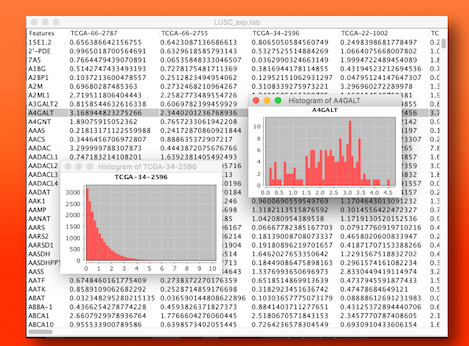Grapnel includes:
-
viewtab FAST csv/tsv file viewer suitable for >100k row CSV files + plots & stats
-
csvsql
Script that lets you perform full SQL queries on csv files (including joins on multiple files). Examples:csvsql "select score from people.csv where age < 40" csvsql "select name,score from people.csv where age <50 and score > 100" csvsql "select sum(score) from people.csv where age < 40" csvsql "select people.name,children.child from people.csv,children.csv where people.name=children.name"
csvsql is based on the h2 database engine
-
grapnel.jar A set of ML/data analysis libraries geared for Groovy, but which can be use in Java or any JVM based language.
- Java (1.7 or later)
- Apache Ant (1.7 or later)
- Apache Groovy (2.0 or later).
Set GROOVY_HOME environment variable to the path where groovy is installed.
export GROOVY_HOME=/Users/james/groovy/
Clone and build grapnel.jar:
git clone git://github.com/jdurbin/grapnel.git
cd grapnel
ant install
The install should build grapnel.jar and copy it and all required 3rd party jars, including weka, to grapnel/target.
Set the CLASSPATH environment variable to include all the jars under grapnel/target/jar, and add the scripts directory under grapnel to your path. For example:
export CLASSPATH="/Users/james/src/grapnel/target/jar/*"
export PATH=$PATH:/Users/james/src/grapnel/scripts/
It's useful, but not strictly necessary, to set the environment variable JAVA_OPTS to give more RAM to the JVM and to optimize for long-running jobs:
export JAVA_OPTS="-Xmx6000m -server -Xss40m"
Type csvsql to test out the installation. You should see the help message for csvsql.
-
grapnel.charts: Support for common kinds of charts: line chart, xyplot, hist. Based on JFreeChart but includes lots of sugar to make it easier to make commonly used charts and support for saving them in various formats. Also has support for creating a chart and displaying it in a GUI with a single command.
-
grapnel.stat: Statistical classes.
- MixtureModel Class to compute parameters of a mixture model given data (based on SSJ), and to classify data into most-likely mixtures.
- KolmogorovSmirnov class to compute KolmogorovSmirnov statistics from data.
- QuantileNormalization classes to perform [quantile normalization] (https://en.wikipedia.org/wiki/Quantile_normalization)
- Sampling Wrappers to simplifying sampling from lists.
-
grapnel.util: Core functionality of grapnel.
- DoubleTable Implements a high-performance 2D table of doubles accessible by index or name. Backed by [colt] (http://acs.lbl.gov/software/colt/) DenseDoubleMatrix. Includes syntatic sugar to allow [] notation, eachRow closures, etc. from Groovy and functionality to read/write tables to files in a fairly high performance way.
- Table Implements a fairly high-performance 2D object table. Same functionality as DoubleTable generalized to a table of objects. Not as efficient as DoubleTable for numeric data, but still fairly efficient.
- DynamicTable Implements a dynamically allocatable 2D table (a 2D Map, essentially). Row and column keys can be any comparable object. Backed by Google HashBasedTable in guava Good performance with lots of Groovy syntax sugar. Read/write to file functionality.
- MultidimensionalMap When a 2D Map isn't enough, MultidimensionalMap allows you to create HashMaps of arbitrary dimensions.
- CounterMap Map that counts unique occurrences of keys.
- FileUtils Number of file utilities, fastCountLines, determineSeparator, etc.
- ImageUtils Utilities for saving AWT/Swing components as JPG/PNG/GIF images.
- OnlineTable Class to allow access to a tabular data file one-row-at-a-time by column name.
- Parser Class to parse options. Fork of Groovy Option Parser to add better help support.
- Perlism Written to provide some functions found in Perl and missed by Perl colleagues.
- RunBash Class to support running bash scripts from Groovy like, "ls -al".bash(). Actually runs the shell with the commands, so it supports wildcards, piping, and other things .execute() chokes on. Even bash scripts can be run, like "for file in $(cat list.txt); do echo $file;done".bash()
- SSHPortForwarder Class to do port forwarding from within Java/Groovy (say, for example, to access a database behind a firewall). Based on jsch.
-
grapnel.weka Support for working with Weka. Lots of support for making an automated pipeline and for making trained classifiers into production-usable self-contained objects. Perhaps most happily for weka library users, includes extensive support for instance IDs, including ability to access instances by ID. Lots of functionality for accessing attributes and instances by name with [] notation in Groovy. Implements additional attribute selection and filter methods. Forms the core of my machine learning automation package wekaMine. Some of the algorithms added to wekaMine include:
- BalancedRandomForest An implementation of a balanced random forest algorithm.
- ExponentialNormalizationFilter Normalize data by ranking and fitting to exponential distribution.
- FishersLDEval Attribute ranking based on Fisher's linear discriminant.
- BimodalityIndexFilter Model attributes as a mixture model, replace each value with a bimodality index based on that model.
-
swiftml Collection of machine learning algorithms packaged nicely. Where wekaMine provides tools to easily automate large scale model selection/evaluation experiments, swiftml aims to provide a clean and easy to use interface to machine learning algorithms in the spirit of, for example, scikit-learn. If you are looking for scikit-learn for Groovy/JVM swiftml might be what you need.
